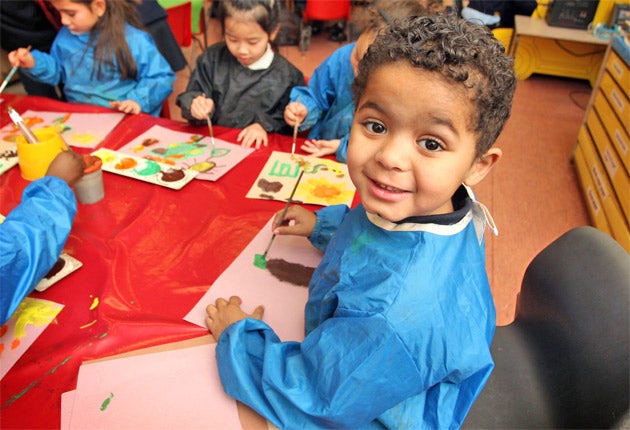One in 10 primaries fails to reach three Rs target

Your support helps us to tell the story
From reproductive rights to climate change to Big Tech, The Independent is on the ground when the story is developing. Whether it's investigating the financials of Elon Musk's pro-Trump PAC or producing our latest documentary, 'The A Word', which shines a light on the American women fighting for reproductive rights, we know how important it is to parse out the facts from the messaging.
At such a critical moment in US history, we need reporters on the ground. Your donation allows us to keep sending journalists to speak to both sides of the story.
The Independent is trusted by Americans across the entire political spectrum. And unlike many other quality news outlets, we choose not to lock Americans out of our reporting and analysis with paywalls. We believe quality journalism should be available to everyone, paid for by those who can afford it.
Your support makes all the difference.Nearly 1,000 primary schools have failed to reach new minimum standards in the three Rs demanded by the Coalition Government.
Primary school league tables released yesterday showed 962 schools – nearly one in 10 of those whose results were published – fall short of its tough new target.
A White Paper published last month warned schools they could face closure or takeover by a successful neighbouring school if they failed to get 60 per cent of their pupils to be proficient in reading, writing and arithmetic by the time they leave primary school.
Yesterday's tables showed 1,334 of the 11,500 schools for whom test results were submitted fell below the target. However, ministers have indicated that schools serving disadvantaged areas would escape punitive action if they can show they are making strides in improving their pupils' performance – which whittles the figure down to 962.
The Schools minister Nick Gibb described the new "floor standards" as "firm but fair", adding: "Currently half of all our 10- and 11-year-old boys who qualify for free school meals are being let down by our education system. It is unacceptable that after seven years of primary school these children are not at the standard in English and maths that they need to flourish at secondary level."
However, he added: "Schools with challenging intakes won't be classified as under-performing if their pupils progress well. We will recognise the unique circumstances of every school."
The number of schools with a perfect score – 100 per cent reaching the required standard in both subjects – rose this year from 282 to 289.
This year's performance tables, though, do not paint the complete picture of primary school standards shown in previous years. Only 11,500 schools' results are included as more than 4,000 schools boycotted the tests for 11-year-olds in English and maths, following the call to sabotage them by the National Union of Teachers (NUT) and National Association of Head Teachers, on the grounds that they encourage teaching to the test.
A review of the tests is being carried out for ministers – which means they will be held again next year. Christine Blower, general secretary of the NUT, said: "This is a snapshot that does not tell us the whole story about children's performance.
"Yet again the case is made to end the demoralising naming and shaming process we have for assessing pupil progress. League tables and constantly changing, pointless floor targets ineed to go and be replaced by properly moderated teacher assessment."
Chris Keates, general secretary of the National Association of Schoolmasters/Union of Women Teachers, said: "Over the last 15 years there has been significant progress in the educational achievements of primary school pupils. In 1995, only 49 per cent reached [the required standard] in English... but by 2009 this had risen to 80 per cent. In maths 79 per cent left primary school having met the expected standard as opposed to 45 per cent in 1995."
The best performing school in the country was Manuden primary school in Bishop's Stortford – a 98-pupil village school where every child achieved the level above that expected of an 11-year-old. Acting headteacher Pauline Gordon said: "This is a really lovely village with supportive parents. We don't believe in hothousing children for the tests."
Case study: Ilderton Primary, Southwark
Their school sits next door to the New Den, home of the notorious Millwall football club. And for a treat sometimes the pupils from Ilderton primary school get to train with some of the squad.
Adopting the language of a football manager, headteacher Kealy Jackson said: "We expect 120 per cent. And if you expect 120 per cent, then you've got to make things fun for the pupils."
The effort has paid off, as Ilderton has come top of the league table that indicates which schools have made the biggest strides in improving their pupils' standards during their years at primary level.
Now Ofsted, the education standards watchdog, has paid special tribute to the pupils' behaviour – not something that one could always say about the notorious fans at their neighbours' home games.
The school inspectors wrote: "Their excellent behaviour contributes to the harmonious environment and sense of purpose."
This year's test results for the 340-pupil school show that 98 per cent of them managed to reach the required standard in both English and maths from a starting point of below the national average.
"We don't just teach to the test," said Ms Jackson. "We have a very broad and balanced curriculum for the pupils."
Ofsted's report added: "There is some very lively teaching that keeps the pupils on the edge of their seats, waiting for what comes next."
Join our commenting forum
Join thought-provoking conversations, follow other Independent readers and see their replies
Comments